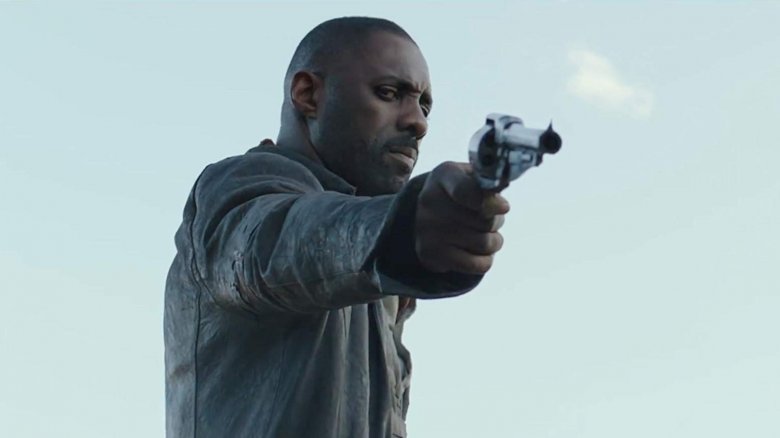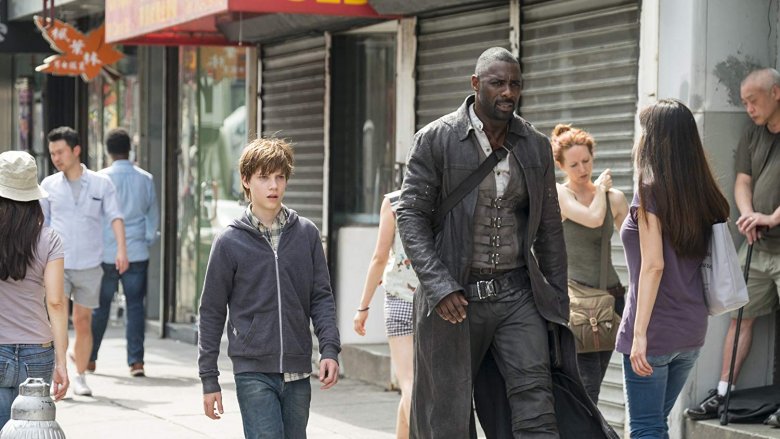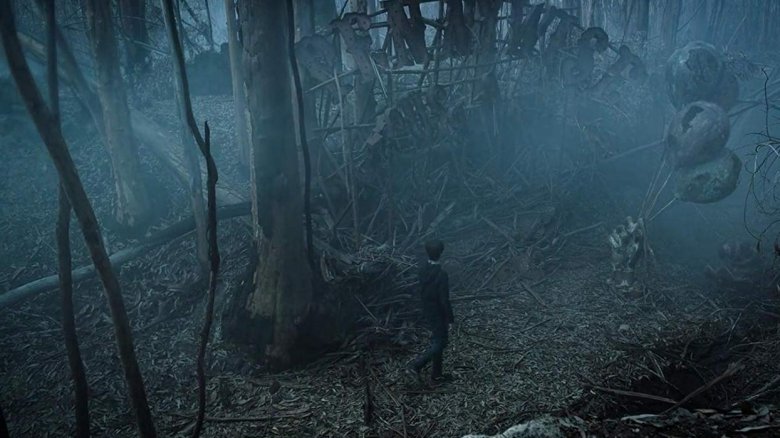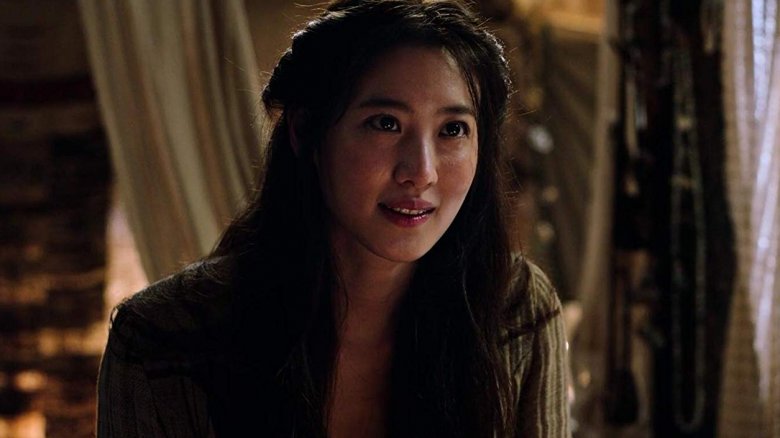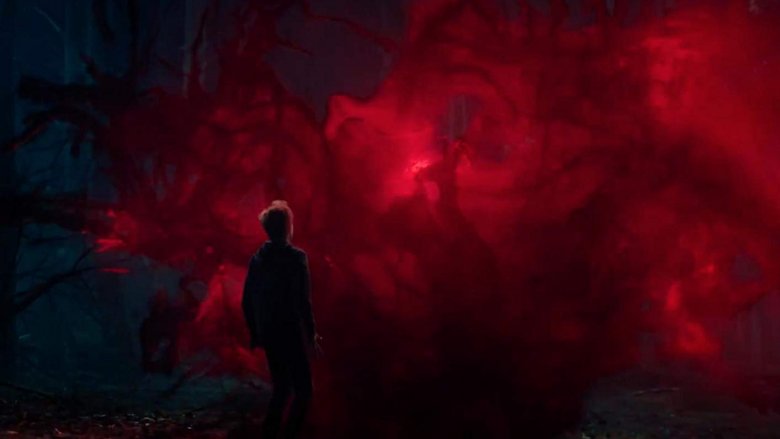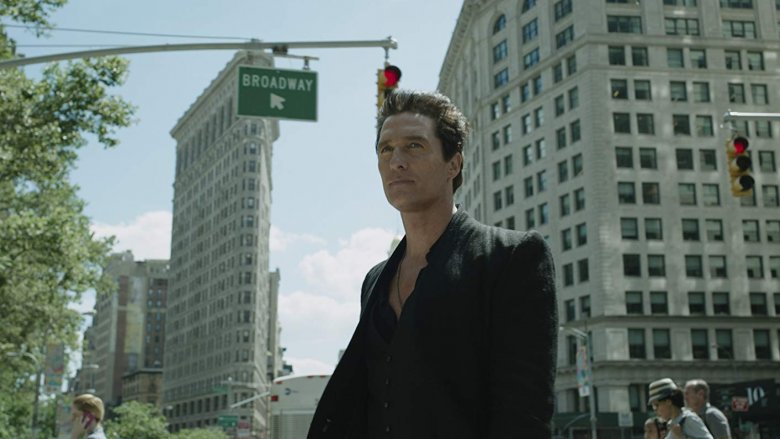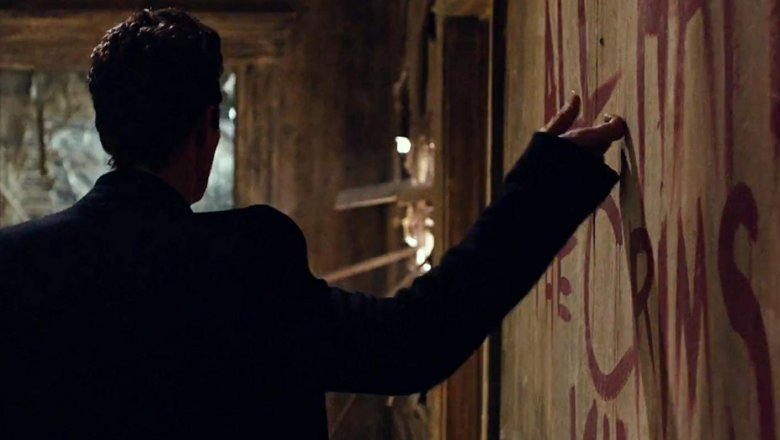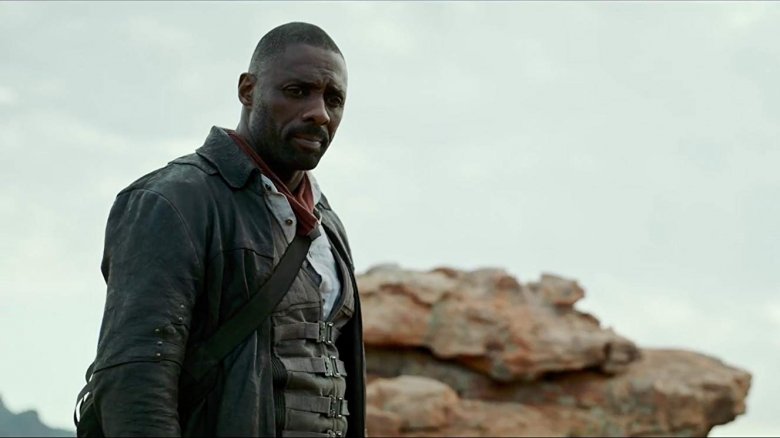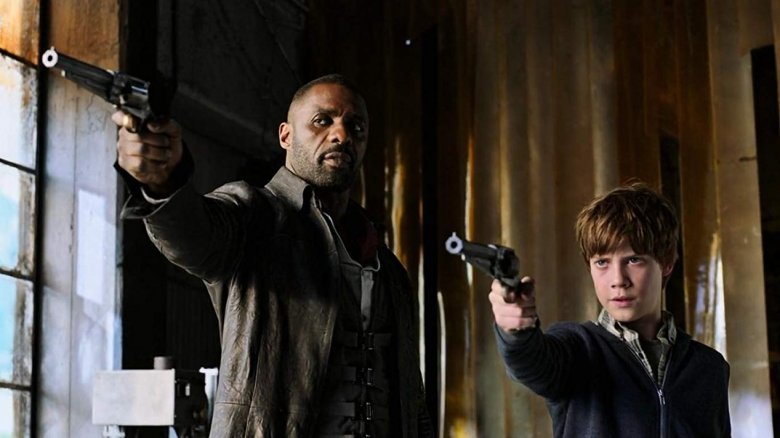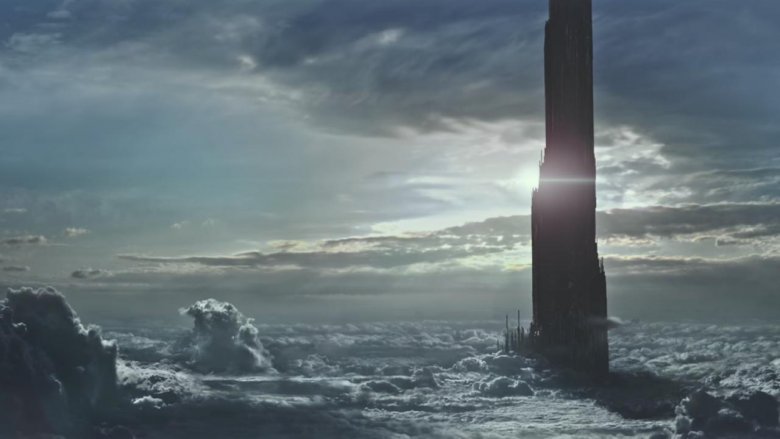The Dark Tower Ending Explained
After years of development, a feature film based on Stephen King's Dark Tower series of novels finally arrived in 2017, starring Idris Elba as the gunslinger Roland Deschain and Matthew McConaughey as the man in black called Walter. The project went through multiple directors, writers, studios, and stars before finally landing in theaters, and what we finally got was more of a retelling of King's story with various mashed-up elements than a straight adaptation. That means fans of the books were left trying to piece various things together once again, and people coming to the saga for the first time were left with a lot of unanswered questions about King's universe and characters. The film didn't perform well at the box office, but it remains a fascinating production because of the way it weaves a new story through King's design while attempting to be both an adaptation and a kind of sequel. With all that complexity in mind, let's explain the ending of The Dark Tower.
A pure shine
Early in the film, as he's evaluating Jake's (Tom Taylor) abilities and whereabouts, Walter's henchman Sayre (Jackie Earle Haley) says of the boy that "his shine is pure," meaning his supernatural abilities are powerful and, more importantly, ready for use in Walter's scheme to bring down the Tower. By the end of the film, Jake has come to believe in his own abilities, and uses them to, among other things, resist Walter's machines and even hold the portal open long enough for Roland to get to him. The reference here is clear. The word "shine," used repeatedly in the film, immediately conjures up memories of Stephen King's classic novel The Shining, and the boy in that story with supernatural abilities of his own. Because The Dark Tower establishes King's fiction as a multiverse of worlds of stories (and The Shining's Overlook Hotel appears in a photo in Jake's therapist's office), we can assume the connection, and understand that Jake is part of a long tradition of gifted children who manage to find their way out of danger. Even among other kids like him in the King canon, though, Jake seems to be particularly gifted, and as he heads out into the universe with Roland, we're left to wonder: Have we only scratched the surface of his powers? What else can he really do with time and training?
Other worlds than these
The Dark Tower is a very lean film, clocking in at a little more than 90 minutes. That's not a lot of time to cover the vast universe King built across eight novels published in three different decades, but we're left with various clues. In Roland's world, Mid-World, Jake discovers broken down machinery, and they make camp at an abandoned theme park that Roland describes as an "ancient" structure whose purpose is lost to history, suggesting that the technology of Jake's era on Keystone Earth has long since moved on. While in the emergency room, Roland sees a television commercial and asks "do the animals here still talk," hinting at yet another past feature of Mid-World. Or is it Mid-World he's referring to? Roland has been wandering for many years, searching for Walter, and he's well aware of the portal system and the many different worlds that exist. In that sense, we can hypothesize that he's been to other worlds before, or at least heard of them. As they go on their journey to the Tower, will Roland and Jake encounter talking animals, advanced civilizations, and other wonders? It's very possible, even if a sequel to this film isn't in the cards right now.
Shining allies
Early in the film, Jake is warned by a homeless man that he knows what will happen to him. Later, that same homeless man is revealed to have once been a boy taken by Walter and his henchmen, and put through the same Tower-breaking machinery before being discarded as a used-up madman. We can also surmise based on the events of the film that there are a number of potential shining kids out in the various worlds (including Keystone Earth) and in Walter's encampment who have now been given at least a little time to live in freedom thanks to Walter's defeat. People who shine can communicate telepathically, and Jake is now revered by Walter's allies as perhaps the strongest of them. As he learns to use his abilities even more, could he perhaps reach out to other shining children and adults, and create some kind of network or alliance? Could he build an army to help Roland in his quest to protect the Tower? Again, it seems we've only seen a little of what he can do so far.
Darkness and fire
At one point early in their travels together, Jake wanders off and encounters a demon who tries to seduce him and Roland by posing as their respective fathers. Roland explains that this demon was able to access them and show off its "darkness and fire" through a tear in the fabric of reality. Like the earthquakes Jake was experiencing on Keystone Earth, it's something that will continue to happen as Walter's machines attack the Tower and the boundaries between worlds grow more fragile. Before Roland was able to stop the machine, Jake got angry enough at Walter to send a beam with his own mind into the Tower, and we've established that his shine is particularly strong. With that in mind, will larger tears in reality open up? It's quite possible that Jake has unwittingly used his own power to unleash more demons on the world, and he and Roland might run into them soon enough.
To hell and back
One of the first things we see Walter do is kneel down at the side of a dying soldier on a battlefield. The soldier tells Walter to "go to hell," and Walter replies "been there" before burning the man alive. We're not given a massive amount of backstory in this rather short film, but it is certainly implied that both Roland and Walter are, in addition to being supernaturally gifted, quite old at this point. We know very little of just how far Walter's abilities really stretch, but we know he seems to have a powerful effect on just about every mortal soul, and he seems powerful enough that his claim of having been to hell can't be outright dismissed as a joke. With all that in mind, and his tendency in King's novels to reappear with different names and faces across the multiverse, it is quite possible that Jake and Roland haven't seen the last of the sorcerer. He could re-emerge at any time looking like someone else, but carrying the same memories... and the same devious goals.
All Hail the Crimson King
Even if we assume Walter is truly dead and will never come back in some reincarnated form, Roland and Jake won't be able to continue their quest without meeting some resistance. Walter's followers are still out there, and they likely exist in some form no matter which world our two gunslingers might venture into, but they're only the foot soldiers in a much larger war. That war is presided over in The Dark Tower's overarching mythos by the Crimson King, an immensely powerful being who exists in the darkness and fire outside our reality. It is his goal to bring down the Tower, and he recruits captains like Walter (and The Stand's Randall Flagg, for example) as allies to achieve that goal. He is a shapeshifting, very old, and very cunning creature who appears in various forms throughout King's multiverse, and though Roland and Jake have defeated Walter, the King will find others to do his bidding. Walter was just the beginning of this quest. The Crimson King's army is large, and he will send more soldiers to kill the gunslingers.
A sign of redemption
SPOILER WARNING for The Dark Tower novels
The Dark Tower film is an adaptation of King's novels and mythos, but it's also something more. Because of the nature of how King's novels played out, the film is actually a canonical sequel of sorts to the books, as Roland sets out on another version of his quest with new versions of his various enemies and allies. That's why Dark Tower book fans flipped out just a little bit when it was revealed that the Horn of Eld would be featured in the film. The Horn is an ancestral artifact passed down through the gunslinger lineage. It eventually made its way to Roland, but in King's novels he lost it at a fateful battle, the same one where he lost his best friends who fought by his side (this is briefly referenced by Walter as he taunts Roland with death). In the film, Roland possesses the Horn, which was itself regained at the very end of King's novels as Roland's quest cycle repeats itself. This is symbolic, as it indicates that he may indeed be a bit closer to finally being able to rest if he can just make the journey again. It also indicates what the end of King's novels suggested, which is that Roland must keep undertaking his quest over and over until the universe is somehow in balance again.
Bound by destiny
Several times throughout the film, Walter repeats to Roland that "everyone who walks with you dies by my hand," referring to his father, his friends, and others we perhaps haven't heard of. By the end of the film, the loner Roland has taken on an apprentice of sorts in Jake, who he dubs a gunslinger, and together they're about to walk out into the universe together. This softening of Roland, and his willingness to take on traveling companions, is the formation of a keystone of King's mythology: ka-tet. In the High Speech spoken before the world of the gunslingers moved on, ka is the equivalent of fate or destiny, the will of the creator. A ka-tet is a group of people brought together by ka, destined to achieve something. In King's novels, Roland's ka-tet begins to form when he meets Jake, then grows when he is joined by a heroin addict named Eddie Dean and a woman with two personalities named Odetta Holmes/Detta Walker. Over time, the ka-tet's membership shifts and is tested, but each member contributes to the quest for the Tower in their own way. It hasn't been spoken in the film yet, but Roland choosing to invite Jake on his travels is the first step in forming his new ka-tet, and perhaps finishing his quest.
Resuming the quest
The formation of a ka-tet is, of course, the completion of Roland's arc over the course of the film, and an important step in his maturation toward being the kind of man who can indeed save the Tower one day. In both the film and in the books, Roland is a loner when we meet him. He is committed to walking the world alone, and to finding Walter (though his motives vary slightly), and he has no real need for a companion other than for some temporary aid, like food or help in a fight or even, in the novels, a little sexual comfort. As time goes on, Roland becomes irrevocably tied to people, whether he likes it or not, and through learning to accept these connections he becomes a leader, a teacher, and a friend once again. It's only through doing these things, through growing personally, that he can enrich his life enough to make the rest of his quest possible. The final moments of The Dark Tower reveal him beginning to become this man, and while he perhaps has a very long way to go, it's a beginning.
